
The Intercept columnist Natasha Lennard details how the combination of anti-Palestinian, Islamophobic repression and very few worker protections across the U.S. has created a “very dangerous constellation” for academic laborers that is “overwhelmingly only facing pro-Palestinian speakers, not speakers who are supporting Israel’s genocide.” She calls it “the New McCarthyism” on college campuses. “A lot of media attention has focused on the spectacle of encampments and the very, very brutal police response,” says Lennard. “What you also have going on behind the scenes is the targeting of individuals who work at universities.”
Transcript
AMY GOODMAN: So, let’s take this broader. Natasha Lennard is with us. She teaches at The New School, is also a columnist for The Intercept, where she has reported on how universities have been cutting ties with pro-Palestine faculty members without tenure, in addition to overseeing police repression sweeps of Gaza solidarity encampments. Your latest piece is headlined “University Professors Are Losing Their Jobs over 'New McCarthyism' on Gaza.” Lay out what you found.
NATASHA LENNARD: Well, first of all, I want to say thank you for my colleague Alexandra and the extraordinary work that our solidarity encampment and participants have been a part of.
Zooming out, as you say, we’ve seen in the last eight months such extraordinary repression from educational spaces, and particularly universities. A lot of media attention has focused on the spectacle of encampments and the very, very brutal police response. But what you also have going on behind the scenes is the targeting of individuals who work at universities.
And it’s a very dangerous conjuncture, because you’re meeting this very specific, politicized, anti-Palestinian, Islamophobic, as well, repression, under the misleading guise of antisemitism and fighting antisemitism, at the very same moment we’ve had years of right-wing and neoliberal attacks on higher education per se. So, educational laborers and academic workers are in more precarious positions as a starting point. And then you’ve got this condition set up wherein it’s very easy to cut ties with academic workers. You add that right-wing agenda of undoing, for ideological and profit-driven reasons, safety for academic workers with the now, unfortunately, highly bipartisan agenda of challenging pro-Palestinian speech and silencing pro-Palestinian speakers, that comes together to a very dangerous constellation, where you’re seeing dozens of people facing job suspensions, people not having their contracts renewed, people facing disciplinary action within their professional circumstances, and these kind of consequences that are overwhelmingly facing only pro-Palestinian speakers, not speakers who are supporting Israel’s genocide. I spoke to a representative from the AAUP, the American Association of University Professors, who said that all of their cases are only related to pro-Palestine speech.
AMY GOODMAN: If you can talk about the difference in how these universities — we just heard Salma Hamamy, just graduated from University of Michigan, the violent police crackdown — and what you see as the characteristics of the schools or the presidents who are not doing this and are setting up committees to negotiate, whether it’s Middlebury or it’s Brown or it’s Evergreen State College?
NATASHA LENNARD: I think what you see is a few outliers who are willing, only by virtue, I would say, of the — responding to steadfast protest, steadfast action taken by students, who continue — and faculty members, who continue to bring back the focus to Gaza, to Palestinian struggle. That doesn’t get lost. So, it’s only in response to steadfast action that you have some universities willing to negotiate at all.
Across the board, what you’re really seeing is all too much comfort with repression and retaliation and this new McCarthyism, to a degree that I’ve not seen, both in terms of a disproportionate, wildly disproportionate policing response to very, very kind of passive, pacifist, peaceful campus protest, and a profound attack on academic freedom and academic speech, including extramural speech, which has been as policed as anything within the classroom.
JUAN GONZÁLEZ: And, Natasha Lennard, you talk about some specific examples, for instance, Danny Shaw, who lost his position at John Jay College after 18 years as a professor of Latin American and Caribbean studies as a result of a campaign of right-wing, pro-Israel harassment?
NATASHA LENNARD: Yes. So, Danny Shaw’s case is one of over a dozen people I spoke to who have either been suspended or not had their precarious labor contracts renewed. Also, I spoke to Mohamed Abdou, who has been working for a year at Columbia, also teaching post-colonial studies, Indigenous studies for 20 years. Jodi Dean, who I believe maybe has been a guest on this show, a brilliant scholar, who was suspended, she’s tenured, so not lost her job, but is facing serious investigation for writing an essay outside of the classroom — what used to be understood as quite clearly protected extramural speech — drawing attention to occupation, genocide and the Palestinian struggle.
Again and again, the pattern is the same. You see public speech made and then targeted by pro-Zionist, pro-Israel groups, right-wing, often far-right, doxxing outlets, things like Campus Reform, Antisemitism.org, and that then creates backlash from within the university and, indeed, from politicians.
AMY GOODMAN: We just have 30 seconds. What’s the role of the American Association of University Professors?
NATASHA LENNARD: It is an organization that supports professors, but it really can’t have a vast grasp on the expanse of retaliation going on here, because it requires professors themselves to report a problem and ask for that case to be taken up. And so, again and again, this retaliation is not being stopped in any sort of formal and official way.
AMY GOODMAN: We want to thank you both for being with us. Natasha Lennard, columnist for The Intercept, we’ll link to your piece, “University Professors Are Losing Their Jobs over 'New McCarthyism' on Gaza.” She’s associate director of The New School’s creative publishing and critical journalism master’s program. And I want to thank Alexandra Chasin, professor of literary studies at Lang College at The New School, part of the faculty encampment and the negotiating team that led The New School Board of Trustees to agree to vote on divestment. This is Democracy Now! Stay with us.

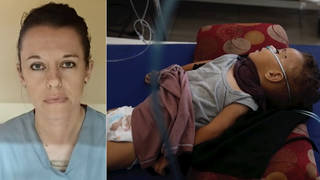
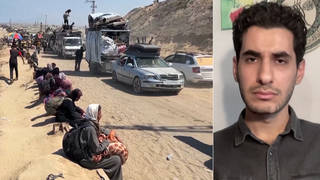
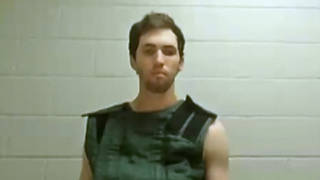
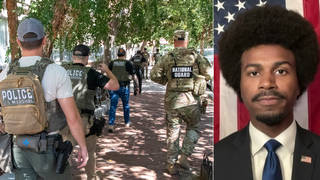





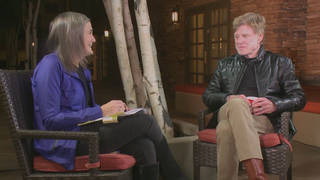
Media Options